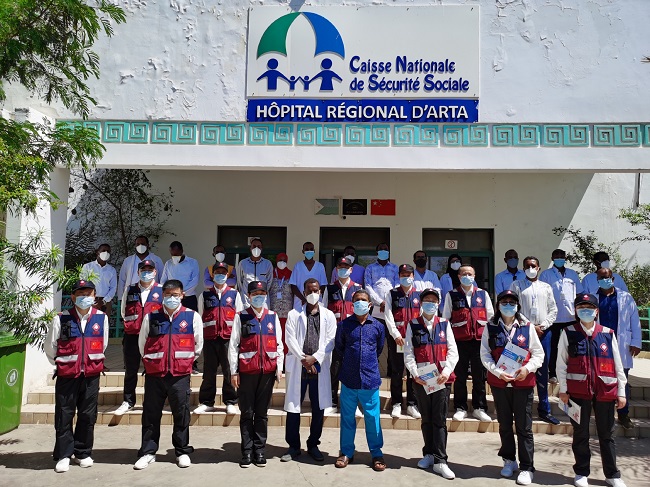Djibouti braves COVID-19 to pursue trade, transport hub

Chinese experts share their experience in the fight against COVID-19 with local doctors in Djibouti on May 3, 2020. [Photo/Xinhua]
Despite the coronavirus pandemic that has halted much economic activity across the globe, Djibouti has maintained its commitment to develop infrastructure in its efforts to realize the dream of becoming a regional trade, transport and logistics hub, as well as transform itself into a middle-income economy.
The Horn of Africa country has been developing ports and transport networks to take advantage of its strategic location, sitting at the crossroads of the Red Sea and the Gulf of Aden, one of the world's busiest trade routes.
Its latest project launched amid the pandemic is transformation of the historical Port of Djibouti into an international business district, which is expected to create 27,000 jobs, directly and indirectly, upon completion.
Inaugurated by President Ismail Omar Guelleh on Thursday, the project will see the historical port transformed into a district called the East Africa International Special Business Zone, which will be developed in six phases.
The first phase, with a total investment of approximately $513 million, will be the International Demonstration Area, the core part of the district.
It involves construction of an exhibition center, including a center of excellence for maritime studies, and conference rooms, a hotel and apartments.
Expected to be completed within five years, the demonstration area will have a site area of 220,500 square meters.
"This project implements the Port-Park-City concept, which refers to the integration of ports, industrial parks and services," Aboubaker Hadi, the chairman of the Djibouti Ports and Free Zones Authority, said during the inaugural ceremony.
"The ports are a key node in the transportation of goods; the international free trade zone brings added value to these goods; and this new business district will facilitate the development of services, particularly in the financial sector."
Transformation of the Port of Djibouti, built in 1888, is expected to advance the country's Vision 2035, the national development strategy to maximize the country's geostrategic position.
To gradually relocate activities of the historical port, Djibouti has built new specialized port infrastructure over the last decade. These include Doraleh Multipurpose Port, Doraleh Container Terminal Management Co and the Ports of Ghoubet and Tadjourah.
Launched in 2017, Doraleh Multipurpose Port is one of the most modern ports in Africa and has the ability to accommodate vessels with up to 100,000 deadweight tonnage.
Doraleh Container Terminal Management Co, which is now fully connected to the Addis Ababa-Djibouti Railway, is a key transshipment hub for the region.
The Ports of Ghoubet and Tadjourah are two multipurpose ports mainly designed to handle salt and potash, respectively, which supplement the service of the other ports.
The country also is developing a heavy industry and petrochemical base dubbed Djibouti Damerjog Industrial Park, which is expected to drive Djibouti's industrialization, as well as the entire East Africa region.
On Sept 12, Guelleh officially launched the beginning of the construction work of an ultra-modern oil port in the industrial park, capable of accommodating the latest generation vessels.
The three kilometer-long oil jetty will berth two ships, one capable of accommodating vessels of up to 100,000 deadweight tonnage and the second for vessels up to 30,000 deadweight tonnage, with an annual throughput capacity of over 13 million tons.
Djibouti also is constructing a floating oil refinery with a capacity of 6 million metric tons in the Damerjog Industrial Park.
The project is expected to position the country as an international bunkering point for ships and a leader in the refined oil market for the East Africa region.
Over the past decade, Djibouti has developed strong relations with China, which through its Belt and Road Initiative has been active in development of some of the country's major infrastructure projects, including ports, railways, airports, pipelines and a free trade zone.
Due to its geostrategic position, as well as its political stability, the country has become a hub for foreign militaries, hosting bases for the United States, Japan, France, Italy and China.


